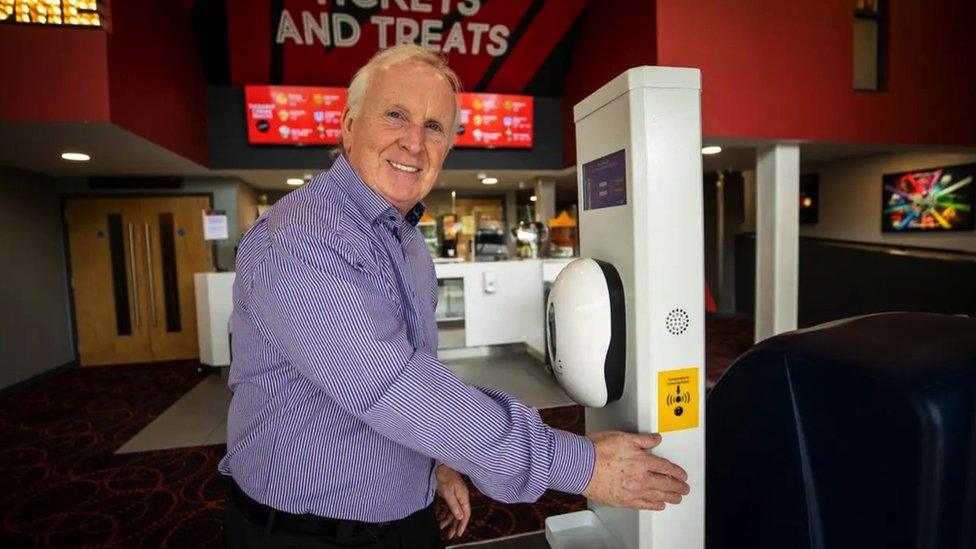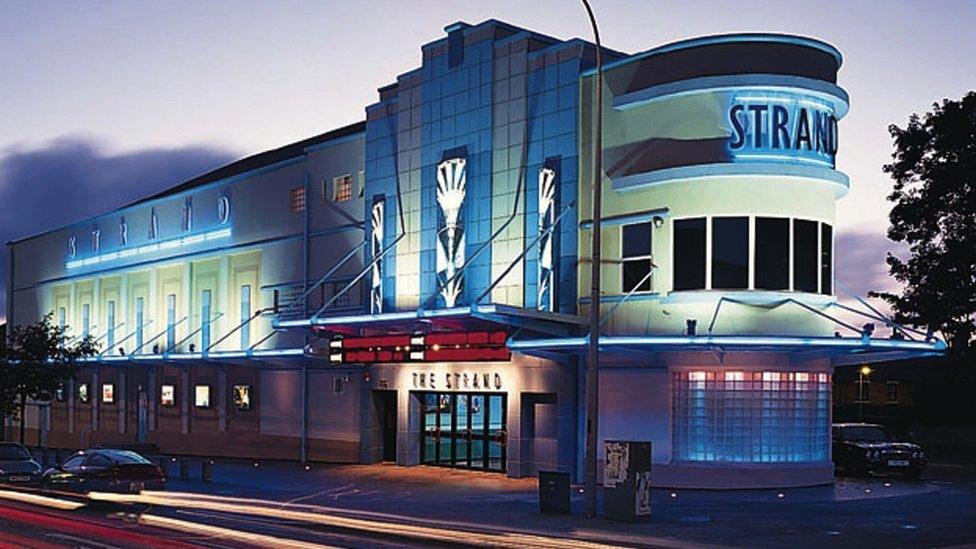Covid-19: NI cinemas in 'serious, serious trouble', operators warn
- Published

Cinemas in Northern Ireland face an uncertain future because of the Covid-19 pandemic, some of the leading operators have warned.
Alongside restrictions and forced closures, many major film releases scheduled for 2021 have been delayed.
Paul Anderson, chief executive of NI's largest chain Omniplex Cinemas, said revenue was down 92% between April and December 2020 compared with the previous year.
However, the businessman said he was certain his business and the sector would survive.
Michael McAdam, managing director of Movie House Cinemas, said: "Everybody is in serious, serious trouble."
If rates relief is not extended beyond this financial year, he added "it is lights out".
"Until we see Hollywood open up, even if we were allowed to open next month, there's absolutely no point, because we don't have any new product to offer our customers.
"I really don't think we're going to see cinemas open until late-May, June or July."

Paul Anderson said cinemas need more support from the NI Executive
Describing the past 10 months as "excruciating", Mr Anderson said he believed cinemas had been "forgotten about" by the NI Executive.
"What kind of business could comprehend a 92% drop year-on-year and try and survive that," he said.
"It never really enters an equation that this is a possibility.
"It's not any of our doing, we were forced to close by government.
"We understand that, but the same government that told us to close our doors are not supporting us."
Mr Anderson, whose cinema has 15 outlets in NI and 18 in the Republic of Ireland, said furlough and rates relief schemes have helped; however, "there are far more outgoings and overheads".
"There are going to be casualties, I have no doubt about that," he continued.
'Dire situation'
At the end of 2020, there were warnings from some of the UK's largest cinema chains about the industry's future.
Odeon owner AMC Entertainment Holdings said its "cash burn rates" were not sustainable, while Cineworld has reported huge losses.
With blockbusters such as the 25th James Bond film being delayed for a third time, there are concerns cinemas may have a limited offering when they can reopen.
Michael McAdam said Movie House had success showing Christmas classics "such as Elf and Home Alone" before the most recent NI lockdown began on Boxing Day, however, older films have "probably been exhausted by now".
"We are in a dire situation," he added.

Michael McAdam said he hoped cinemas can survive until the bigger films are released
"We need government help, like so many industries do," he explained.
"We are product-driven and we know if we can get over this rough patch that people will return to the cinema and we really look forward to welcoming our customers back.
"Given the number of titles that we have yet to show that should have been out last year, once they start to release I believe people will be at the cinema every fortnight.
"If we think of Top Gun, the market for that will be huge, James Bond as well will do brilliant business, we just hope we can survive until that time."

The Strand Arts Centre in east Belfast operates as a not-for-profit charity
Mimi Turtle, chief executive of Strand Arts Centre in east Belfast, said there could be difficult decisions about its future if circumstances do not change in the coming months.
The Strand is NI's oldest cinema and celebrated its 85th birthday in December.
"We very much rely on the cinema income to keep the building going and to subsidise the rest of our arts and community activities," she said.
"It is also the only surviving traditional art deco picture house left in Northern Ireland."
Ms Turtle described the centre as the "heart" of the area, adding that 37% of patrons walk to the building.
There is also a need to "continually invest", she added, with the Strand competing both against larger cinemas and people watching films at home.
"Whenever you are always having to re-invest it makes it all the harder to cope with a loss of income in one year."
Support packages
All three cinemas said they were disappointed the sector could not apply for a £26.1m support package announced by the Department for the Economy in January to support larger hospitality and tourism businesses with a net annual value (NAV) of £51,001 or above.
The department said this scheme was "designed within a limited budget to support large businesses within these sectors only".
"Cinemas, which are leisure and entertainment, were eligible to apply to the Arts Council's Stability and Renewal Programme for Organisations (SRPO)," a spokesperson added.
Paul Anderson from Omniplex said: "They came out and said they would support hospitality and tourism and deliberately excluded leisure and entertainment.
"We feel extremely aggrieved at the moment; at times you feel like a punching bag."
Mimi Turtle said although the Strand Arts Centre would not be sizeable enough for the scheme, she would feel strongly that it should include the cinema sector.
Omniplex, Movie House and the Strand Arts Centre confirmed they have applied for the SRPO fund, however, final decisions have been delayed due to high demand.
"The process will take just over a further week to complete, quite likely an announcement made close to 8 Feb," the Arts Council said.
The cinemas told BBC News NI they would welcome support from this fund, however, as it does not take NAV into account they believe more support should be offered by the executive to help larger cinemas.
Related topics
- Published22 January 2021

- Published7 December 2020

- Published18 January 2021

- Published19 November 2020

- Published29 January 2021
